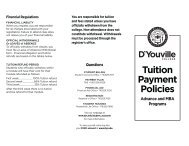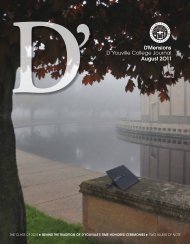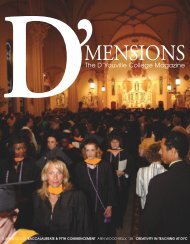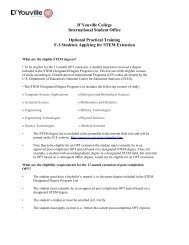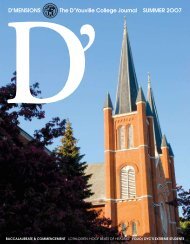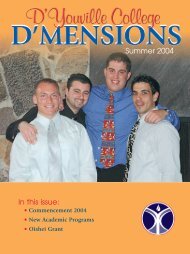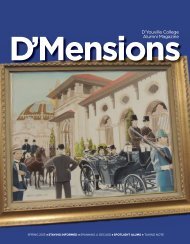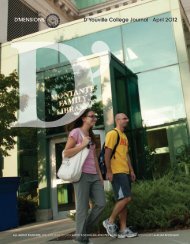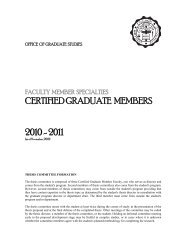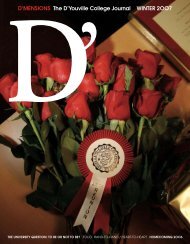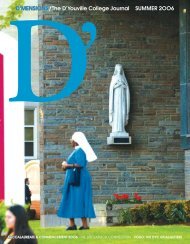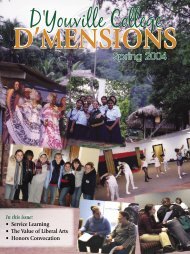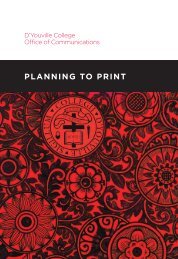D'Mensions Spring 2005.indd - D'Youville College
D'Mensions Spring 2005.indd - D'Youville College
D'Mensions Spring 2005.indd - D'Youville College
You also want an ePaper? Increase the reach of your titles
YUMPU automatically turns print PDFs into web optimized ePapers that Google loves.
Sister Denise A. Roche, president of D’Youville, traveled to Budapest in late October to sign theagreement. The unique arrangement allows students enrolled at BBI, who complete specific programsand successfully complete a Hungarian language program, to earn one-year credit (approximately33-39 credits academic credits) at D’Youville. According to college officials, the credits will apply to afive-year bachelor/master’s in the international business degree program offered at D’Youville <strong>College</strong>or a bachelor’s degree program in global studies.D’Youville <strong>College</strong> students will be able to take the Hungarian language program at BBI as partof their requirement to complete the program, which may be started at either institute. They will berequired to attend the Hungarian institute for one year.“This program will greatly benefit the students participating by introducing them to the culturesof Hungary and the United States and to exciting experiences they would never have otherwise,” saysSister Denise. “They will also bring their own perspectives to the classroom and enrich the educationalexperience for others. It will enhance the programs at both schools, increase enrollments, and forAmerican students, introduce them to Hungary: its culture and their friendly people.”“We think many children of Hungarian descent will be interested in learning more about theirheritage, culture and Hungary itself,” says Ronald H. Dannecker, director of admissions at D’Youville,who developed the agreement with BBI.In addition, BBI enrolls students from all over the world and they would be eligible to participate inthe D’Youville-BBI program. “This could bring students from a number of countries to our campus,”Dannecker said.According to Philip J. Skotte of the consular section of the U.S. Embassy in Budapest, more and moreAmerican colleges and universities have an interest in establishing educational programs in Hungary.“We are seeing an increasing number of institutions interested in Hungary and East Europe,” he saidat a fund raising reception for the Calasanctius Training Program. (A number of Western New Yorkschools participate in this program that brings Hungarian students here for advanced degrees.)Balassi Balint Institute is named for one of Hungary’s noted literary figures, Balassi Balint (1554-1594) who was the first prominent, world-class representative of Hungarian-speaking poetry and thecreator of new poetic forms.The Institute is located near the historic Danube River and was established in 2002 to promote theHungarian language and culture. Today students from all over the world attend BBI.D’Youville has already started promoting the program on its campus and to outside organizationsand hopes to have students traveling to Budapest in 2005.■A similar arrangement, the Semester Study Abroad Program developed by Dr. John Abbarno andthe liberal arts faculty, was initiated in 2003 in Florence, Italy. D’Youville itself houses and directsthis program instead of consigning the students to European universities or colleges with their owncurricula. The Center for Academic Programs Abroad Institute, which helped set up the program,houses classes at its site and offers classes that specifically satisfy 12 credit hours of humanitiesrequirements within the DYC core curriculum, so that any student embarking on this venturecan continue on the path to graduation. The semester-long experience offers both the confidencebuildingexperience of independent living and fosters deepened appreciation of differences inlanguage, literature, history and social values, thereby developing a heightened critical sensibilityto Italian/European culture. One student described Italian life as a “simple life with style.” Thestudents did well academically. Their physical conditioning was challenged. Without cars, theyhad to walk everywhere, maintaining the classical balance written about by the Roman philosopherSeneca, a healthy mind and body.■David Kelly and Ruth Kelly, history professors at D’Youville <strong>College</strong>, have been taking studentsto Ireland since 1999. The students study Irish history during the spring semester and then travel toIreland for two weeks in the summer. The travel group is limited to six or seven students making itpossible to lodge in Irish homes. This experience gives the students a real sense of Irish life.International FOLIOITALYIRELANDAs early as 1966,D’Youville studentsspent their junioryear abroad atRosary <strong>College</strong>,Freiburg, Switzerland.13



